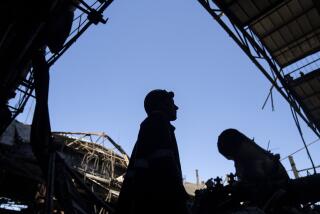Bulgaria Is in the Dark Much of the Time and Is on Brink of a Cold, Hard Winter
- Share via
SOFIA, Bulgaria — The pattern of electricity supply is two hours on, two off, and Sofia is even running out of matches, candles and kerosene.
The periodic darkness and prospects of a cold, hard winter are symptomatic of Bulgaria’s worst economic and political crisis. Prime Minister Andrei Lukanov and his Socialist government resigned last month after a paralyzing general strike and street demonstrations. Selection of a new government is pending.
Dimitar Sokolov, deputy chairman of the Committee for Power Generation, said that the electricity supply may be erratic even if Bulgaria’s crippled nuclear plant is repaired and brought back into normal service.
Oil for heating also is a question mark. Unless Soviet crude oil deliveries are made as expected, “the whole district heating system would be in danger,” he said.
Sokolov said heating in Sofia is provided exclusively by oil-fired plants, and oil storage facilities depots are only one-third full.
Moscow has supplied most of Eastern Europe’s oil for years, but the Soviets are missing deliveries because of their own economic problems.
Four Soviet 440-megawatt reactors and a 1,000-megawatt reactor at Bulgaria’s only nuclear power station, on the Danube River at Kozlodui, provide 30% of Bulgaria’s electricity.
The 1,000-megawatt reactor went down at the end of October for the second time in four months because of a mechanical problem.
Another 1,000-megawatt reactor is scheduled to start up in mid-January, increasing the country’s power supply by 10%, but whether it will is uncertain.
Hospitals, government offices, other public institutions, industrial enterprises and food shops are exempt from the power cuts, Sokolov said, but the government has imposed power restrictions on industry.
Stores can operate during the daylight hours, but when the power is off they close for the day between 5 and 6 p.m., the time most workers could do their shopping.
Reporters recently happened into a basement restaurant where employees were huddled around a kerosene lamp waiting for the lights to go on. They did, and revealed 15 or 20 other customers waiting in the dark.
Daily life becomes ever more difficult for Bulgaria’s 9 million people.
“You have to adapt to the situation as best you can, but people are growing ever more nervous,” said Valery Lazov, a Sofia taxi driver.
“People these days seem to think only about all the items that won’t be available in the shops tomorrow. Breakfast for our third-grade daughter has to be prepared the day before because there is no light in the morning.”
Lazov added, however, that he was better off than many others because he has “a storage battery to operate the radio, and I have a lamp from the car.” He said some people he knew didn’t even have candles. Matches are at a premium.
Elitsa Velichkova, a 16-year old Sofia high school student, said her family was “very angry because there is no television” and had “run out of kerosene for the lamp.”
Sokolov belittled the technical and personnel problems at the Kozlodui nuclear plant, where experts from the International Atomic Energy Agency have been reviewing technical and safety conditions.
In a recent letter, Kozlodui employees warned of inadequate safety precautions and lack of expert personnel for the new 1,000-megawatt reactor. Sokolov said of the letter: “We did have enough personnel by the time the letter arrived, but they had to take exams, and most of them have done so in the meantime.”
Nearly a dozen specialists from the Soviet Union were flown in to help out for several months, he said.
An official at the nuclear agency’s headquarters in Vienna, speaking anonymously, indicated that the small, Soviet-made reactors were outdated and practically impossible to modernize.
More to Read
Sign up for Essential California
The most important California stories and recommendations in your inbox every morning.
You may occasionally receive promotional content from the Los Angeles Times.













